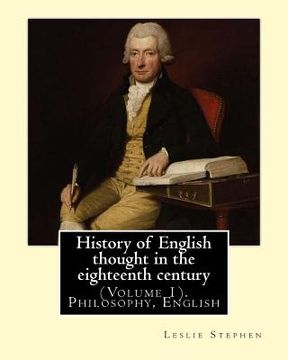History of English thought in the eighteenth century. By: Leslie Stephen: (Volume 1). Philosophy, English (en Inglés)
Reseña del libro "History of English thought in the eighteenth century. By: Leslie Stephen: (Volume 1). Philosophy, English (en Inglés)"
Sir Leslie Stephen KCB (28 November 1832 - 22 February 1904) was an English author, critic, historian, biographer, and mountaineer, and father of Virginia Woolf and Vanessa Bell.Stephen was born at Kensington Gore in London, and son of Sir James Stephen and Lady Jane Catherine (née Venn) Stephen. His father was Colonial Undersecretary of State and a noted abolitionist. He was the fourth of five children, his siblings including James Fitzjames Stephen (1829-1894) and Caroline Emilia Stephen (1834-1909).His family had belonged to the Clapham Sect, the early 19th century group of mainly evangelical Christian social reformers. At his father's house he saw a good deal of the Macaulays, James Spedding, Sir Henry Taylor and Nassau Senior. After studying at Eton College, King's College London and Trinity Hall, Cambridge, where he graduated B.A. (20th wrangler) in 1854 and M.A. in 1857, Stephen remained for several years a fellow and tutor of his college.He recounted some of his experiences in a chapter in his Life of Fawcett as well as in some less formal Sketches from Cambridge: By a Don (1865). These sketches were reprinted from the Pall Mall Gazette, to the proprietor of which, George Murray Smith, he had been introduced by his brother. His second marriage was to Julia Prinsep Duckworth (née Jackson, 1846-1895). Julia had been born in India and after returning to England she became a model for Pre-Raphaelite painters such as Edward Burne-Jones.[5] In 1867 she had married Herbert Duckworth (1833 - 1870) by whom she had three children prior to his death in 1870. Leslie Stephen and Julia Duckworth were married on March 26, 1878. They had four children: Vanessa (1879-1961) married Clive Bell Thoby (1880-1906) Virginia (1882-1941) married Leonard Woolf Adrian (1883-1948) In May 1895, Julia died of influenza, leaving her husband with four young children aged 11 to 15 (her children by her first marriage being adult by then).In the 1850s, Stephen and his brother James Fitzjames Stephen were invited by Frederick Denison Maurice to lecture at The Working Men's College. Leslie Stephen became a member of the College's governing College Corporation.[7] Stephen was an Honorary Fellow of Trinity Hall, Cambridge, and received the honorary degree Doctor of Letters (D. Litt.) from the University of Cambridge and from the University of Oxford (November 1901). While at Cambridge, Stephen became an Anglican clergyman. In 1865, having renounced his religious beliefs, and after a visit to the United States two years earlier, where he had formed lasting friendships with Oliver Wendell Holmes, Jr., James Russell Lowell and Charles Eliot Norton, he settled in London and became a journalist, eventually editing the Cornhill Magazine in 1871 where R. L. Stevenson, Thomas Hardy, W. E. Norris, Henry James, and James Payn figured among his contributors. In his spare time, he participated in athletics and mountaineering. He also contributed to the Saturday Review, Fraser, Macmillan, the Fortnightly, and other periodicals. He was already known as a climber, as a contributor to Peaks, Passes and Glaciers (1862), and as one of the earliest presidents of the Alpine Club, when, in 1871, in commemoration of his own first ascents in the Alps, he published The Playground of Europe, which immediately became a mountaineering classic, drawing-together with Whymper's Scrambles Amongst the Alps-successive generations of its readers to the Alps. During the eleven years of his editorship, in addition to three volumes of critical studies, he made two valuable contributions to philosophical history and theory. The first was The History of English Thought in the Eighteenth Century (1876 and 1881). This work was generally recognised as an important addition to philosophical literature and led immediately to Stephen's election at the Athenaeum Club in 1877....

